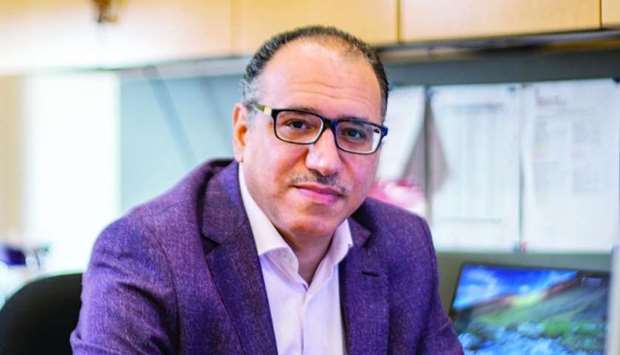A study conducted among patients who have recovered from Covid-19, on the possibility of reinfection of the disease, has concluded that such cases are very rare in Qatar.
A team led by Prof Laith Abu-Raddad, professor of Infectious Disease Epidemiology, Weill Cornell Medicine-Qatar (WCM-Q), a Qatar Foundation partner university in collaboration with the Ministry of Public Health and Hamad Medical Corporation, conducted the nationwide study.
The study was conducted on a large cohort of over 100,000 people, all of whom had contracted and recovered from Covid-19. For the purpose of this study, all cases were tested again after 45 days of the first positive result. Those that tested positive for the second time were assessed to see whether their new positive test reflected a true reinfection.
“The study concluded that reinfections in Qatar are rare, occurring at a rate of less than four in 10,000 cases. All cases of reinfections recorded so far have been mild, with only one case needing hospitalisation for a short period of time. Not a single death in reinfected cases has been recorded so far,” said Prof Abu-Raddad.
“Although cases of reinfections have been recorded worldwide, due to their low numbers and several other factors involved, we cannot rule out the possibility that some of them could be false positives,” said Prof Abu-Raddad. He also highlighted that not enough time has passed since the virus first struck for the medical research community to draw definitive conclusions about reinfections.
There is a possibility that some of the reinfections detected were not true reinfections. Prof Abu-Raddad explained, “It is possible that some of those infected persons may not have completely eliminated the first infection, or one of their tests could have been a false positive. We plan to shortly start genetic sequencing of these reinfections to compare the genetic code of the virus in the first infection and the reinfection for the final verification on each identified reinfection.”
There has been a lot of discussion surrounding immunity as well – some reports mention how a drop in antibodies has been seen two to three months after infection, spreading concern that surviving Covid-19 would offer little protection against future coronavirus infections, some going as far as saying a vaccine might not be effective.
“It is premature, if not dangerous, to draw such conclusions without solid evidence. In reality, it is not at all unusual for antibody levels to drop following an infection. The drop in antibodies is not necessarily an indication of the inability of the body to fight the virus, rather it shows that the immune system works efficiently. Once it has tackled an infection and it is convinced that there is no need for high levels of antibodies, it goes into ‘rest mode’, wherein antibodies levels can drop. If and when the immune system does detect another threat, it quickly starts producing antibodies again,” noted, Prof Abu-Raddad.
This supports what has been observed in Qatar so far and may explain why all the cases of reinfection have been mild. There is growing evidence that the body is able to rapidly respond to the virus the second time around, and that is because there are immune memory cells that can mount a better and faster response.
“What we know so far is that people do develop an immune response – quite a strong one in the vast majority of cases. What is not completely clear yet is how long the immune response lasts. One thing of concern here is that some of the reinfected persons were recorded to have high viral loads and thus can still spread the virus to others.
“While our findings are encouraging, they do not mean Covid-19 recovered patients should assume that they have developed long-term immunity. It is important to exercise caution, and everyone should continue to comply with the control measures of masking and social distancing. Until a vaccine is developed, these preventive measures are our best bet to prevent infection as well as reinfection,” Prof Abu-Raddad added.

